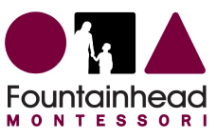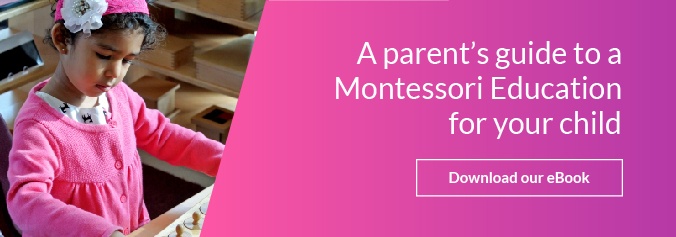As parents, few decisions feel as consequential as choosing the right early childhood environment for your toddler. The options can be overwhelming, with Montessori schools and traditional daycares representing two distinctly different approaches to early childhood care and education. At Fountainhead Montessori School, we believe parents make the best choices when they understand the fundamental differences between these options and can align their selection with their family's values and their child's needs.
Understanding the Fundamental Differences
Before comparing specific aspects of Montessori and traditional daycare, it's important to recognize the philosophical difference that shapes everything else. Traditional daycares primarily focus on providing safe, supervised care while parents work. Montessori, however, is first and foremost an educational approach that integrates care with a comprehensive developmental philosophy.
This core difference influences everything from the physical environment to daily activities, staff qualifications, and long-term outcomes. Let's explore these differences to help you determine which approach might be right for your toddler.
The Physical Environment
Traditional Daycare Environments
Most traditional daycares are designed with safety and supervision as primary concerns. They typically feature:
- Bright, colorful decorations and plastic toys
- Age-segregated rooms (infants, young toddlers, older toddlers)
- Adult-sized furniture with child-sized tables for activities
- Play areas with toys chosen primarily for entertainment value
- Group-oriented setups with shared materials
Montessori Environments
Montessori classrooms, even for toddlers, are carefully prepared environments designed to foster independence, concentration, and development. Key features include:
- Natural materials and subdued colors creating a calm atmosphere
- Child-sized furniture throughout the environment
- Carefully arranged, accessible shelves with materials displayed in order
- Activities and materials designed for specific developmental purposes
- Areas for movement, practical life, language, sensorial experiences, and more
- Mixed-age groupings that span approximately three years
The Montessori environment is intentionally designed to allow freedom of movement and choice within a structured framework, encouraging toddlers to develop independence and concentration from an early age.
Daily Activities and Curriculum
Traditional Daycare Approach
In many traditional daycares, the daily schedule often includes:
- Group activities led by teachers (circle time, songs, games)
- Free play periods with toys
- Outdoor play (weather permitting)
- Meals and snacks at designated times
- Naps on a set schedule
- Occasional art projects, often product-oriented
While high-quality daycares may incorporate educational elements, the primary focus is typically on care, socialization, and entertainment rather than a cohesive educational approach.
Montessori Approach
The Montessori toddler program offers a comprehensive curriculum specifically designed for this developmental stage:
- Extended periods of uninterrupted work time where children choose activities
- Practical life exercises (pouring, spooning, hand washing, dressing)
- Sensorial materials to refine the senses and build cognitive foundations
- Language-rich environment with classified cards, books, and conversation
- Fine and gross motor development activities
- Introduction to art, music, and nature
- Grace and courtesy lessons (please, thank you, waiting turns)
Activities in a Montessori toddler program aren't just keeping children busy—they're designed to meet specific developmental needs during this crucial period. Each material and activity has multiple purposes, simultaneously developing physical coordination, concentration, order, independence, and cognitive skills.
Social Development Approaches
Traditional Daycare Socialization
In traditional daycares, socialization often involves:
- Group activities where all children participate simultaneously
- Teacher-directed sharing and turn-taking
- Emphasis on getting along and following group norms
- Large group sizes with children of exactly the same age
Montessori Social Development
The Montessori approach to social development is more nuanced:
- Natural socialization through a prepared community environment
- Freedom to work alongside peers or individually as desired
- Grace and courtesy lessons that teach social skills explicitly
- Mixed-age groupings that allow for mentoring relationships
- Conflict resolution skills taught through modeling and guidance
Rather than forcing artificial sharing or group participation, Montessori environments allow social skills to develop naturally while providing explicit lessons in social graces. Children learn to respect others' work, communicate effectively, and resolve conflicts peacefully.
Making Your Decision
When deciding between Montessori and traditional daycare for your toddler, consider:
- Your child's temperament and needs: Some children thrive with more structure, while others benefit from the freedom within limits of Montessori.
- Your family's values: Does your family prioritize independence, intrinsic motivation, and a holistic approach to development?
- Long-term educational goals: Are you looking for consistency in educational philosophy throughout early childhood?
- Practical considerations: Location, hours, and cost will inevitably factor into your decision.
- Visit both types of environments: Nothing replaces seeing different environments in action and observing how your child responds.
Whether you choose Montessori or traditional daycare, the most important factor is finding an environment where your child feels safe, respected, and engaged. By understanding the fundamental differences between these approaches, you can make an informed choice that aligns with your family's values and your child's unique needs.
The Fountainhead Montessori Difference
At Fountainhead Montessori School, our toddler program offers the authentic Montessori experience that supports this crucial stage of development. We invite you to visit our campus, observe our classrooms, and see the difference a prepared environment and specialized approach can make in your toddler's development.












Let us know what you think about this post
Put your Comment Below: